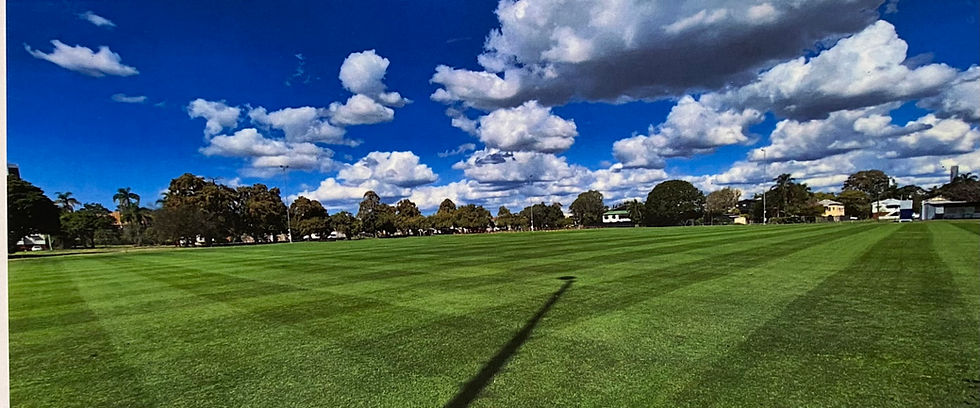Liquid Thatch Treatment for Renovations with Terralift T-Thatch
- Greenway Turf Solutions

- Sep 11, 2024
- 3 min read
Updated: Feb 3

Introduction
Thatch is a layer of organic material that accumulates between the soil surface and the green foliage of turfgrass. It consists of both living and dead plant parts, including roots, stems, and decomposed leaves. The accumulation of excessive thatch in a turf surface can result in several issues, including:
Surface Softness
An increased thatch layer creates a spongy surface that can affect ball roll, green speed and overall playability.
Constant Dampness
Thatch retains moisture, which can create a persistently damp playing surface. This excess moisture can negatively affect playability and turf health.
Nutrient Trapping
The organic matter in thatch can trap nutrients, leading to uneven distribution and potential nutrient imbalances. This can affect turfgrass health, resulting in poor growth and increased susceptibility to stress.
Horizontal Root Growth
Excessive thatch encourages turfgrass roots to grow horizontally rather than downward. This shallow root system can weaken the turf, making it more susceptible to drought stress and disease.
Disease Harbour
Thatch provides an ideal environment for various turfgrass diseases. As it retains moisture it can create a microclimate conducive to pathogen development. This can lead to increased disease incidence and severity.
To manage thatch effectively, turf managers incorporate practices such as core aeration, scarifying/verti-cutting and regular topdressing. These measures will help improve soil aeration and maintain a healthy, resilient turfgrass surface.
Terralift T-Thatch applications will produce drier, firmer surfaces with a more aerobic soil profile. Incorporating Terralift T-Thatch to a turf management maintenance schedule can help get the most out of mechanical renovation practices.

Thatch Treatment for Renovations in a Two-Part Liquid Formulation
Terralift T-Thatch is a scientifically formulated combination of:
Concentrated decomposing enzyme solution (Part A) to rapidly breakdown thatch/OM into its cellulose, silicate and humate parts.
Digestion Microbes (Part B) To convert the decomposed thatch/OM into plant available nutrition and clear soil pore spaces for better aeration.

Trial Results
T-Thatch Excess Organic Material Removal Trial 1
Growing Medium
Sand/soil push-up green.
Method
T-Thatch was applied to half the green at 48L/Ha.
The entire green was scarified 15 days after the treatment.
Results
38% more material was removed from the T-Thatch half of the green compared to the untreated half.

T-Thatch Excess Organic Material Removal Trial 2
Growing Medium
USGA Spec Green
Method
T-Thatch was applied to half of the trial area at 48L/Ha.
The trial area was scarified 21 days after the treatment.
Results
The T-Thatch treated area removed an extra 30% of thatch material compared to the untreated plot.

T-Thatch Organic Matter Breakdown Trial
Growing Medium
Sand/soil push-up green.

Method
Week 1, half the green was treated with T-Thatch at 48L/Ha.
23 days after the treatment, the entire green was scarified.
T-Thatch was then applied to the same half of the green monthly, for 3 months at 48L/Ha.
3 fertiliser applications were also applied to the entire green.
Results
Organic matter readings at weeks 1 and 18 show that T-Thatch consumed accumulated OM created by the growth cycle and provided lower OM compared to the untreated half of the green.
T-Thatch applications prior to renovations assisted in removal of thatch and subsequent applications post-renovation assisted with maintaining lower OM levels.
Application Information
Terralift T-Thatch applications are best made as a thatch treatment for renovations.
Dilution: 1:10+ litres of water
Pack size: 12L
Standard thatch treatment
Apply T-Thatch to existing thatch to aggressively consume dead organic matter content, free up water/air movement and allow top-dressing sands into the profile.
Standard rate: 36L/Ha
Heavy thatch: 48L/Ha
Annual treatment to help reduce seasonally produced OM
Apply once each season to consume accumulated organic matter created by the growth cycle before it becomes very stale.
Apply at: 36L/Ha
Scarifying and verti-cutting
Improve the results of scarifying and verti-cutting by applying a T-Thatch treatment 10 to 14 days prior.
Standard rate: 36L/Ha.
Heavy thatch: 48L/Ha.
Intensive thatch program
For deep or layered thatch, we recommend the following program.
Week 1: Scarify/verti-cut 3mm deep. Follow with Rocastem 10L/Ha and T-Thatch 36-48L/Ha.
Week 3: Scarify/verti-cut to 3mm. Apply T-Thatch 36-48L/Ha.
Week 5: Scarify/verti-cut 5-10mm deep.
For more information on T-Thatch, please contact a GTS Technical Field Agent.

.png)



Comments